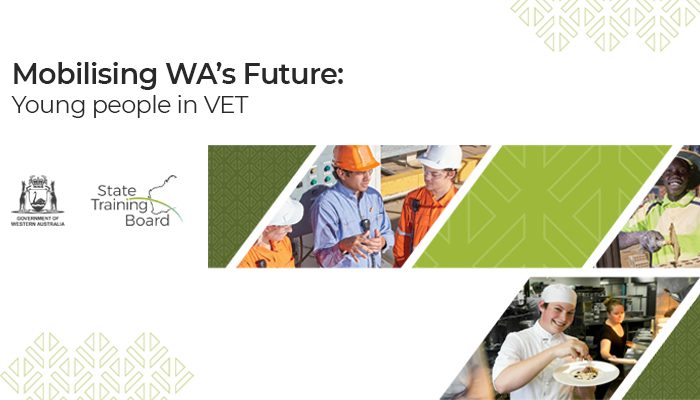
Our work
The State Training Board's State Training Plan lays the foundation for a highly skilled workforce through an innovative, sustainable and contemporary training system. It contains strategies that will contribute to achieving the State Government’s major priorities for the Western Australian economy and labour market.
In order to achieve these strategies, the Board undertakes projects, tasks and activities aligned with the priorities set out in the State Training Plan. We work closely with industry, employers and business, training providers and other key stakeholders to develop solutions that will address our training and workforce development needs now and into the future.
Find out more about our State Training Plan and other projects below.
State Training Plan

The Board’s State Training Plan 2023-24 is a key strategic document that outlines the priorities for the State Government’s investment in VET to support the current and future skills and training needs of the State's industries.
The Board’s role is to establish, enable and support policies, strategies and activities that will help ensure the VET sector develops and delivers the skills needed by Western Australian industries for Western Australian jobs. The State Training Plan 2023–24 has been developed in the context of broader State Government policies and priorities, to ensure that public investment in VET supports the strategic development of the State’s economy.
The State Training Plan 2023-24 was released by the Minister for Training and Workforce Development on 5 July 2023. The Plan sets out four key priorities to guide a well-funded, agile and innovative VET sector that supports the strategic development of the State's industries and the economy. These are:
1. Advocating for Western Australian skills needs in national skills reform
Ensure WA’s priorities, unique regional challenges and skills shortages are represented at the national level, through effective and collaborative engagement with Jobs and Skills Australia (JSA).
2. Preparing a skilled workforce for energy transformation and decarbonisation targets
Thousands of new jobs will be created across current and emerging industries as WA moves towards net-zero emissions by 2050.
3. Managing a sustainable pipeline of apprentices and trainees
Apprentices and trainees form the backbone of the skilled workforce in multiple industries in WA and sustaining a pipeline of skills is vital for the State to prosper.
4. Building regional workforce skills and capacity
WA’s regions are unique and they are experiencing significant workforce challenges. Four out of five regional businesses are affected by the skills crisis.
View the State Training Plan 2023-24
View the Executive Summary of the State Training Plan here
Mobilising WA's Future: Young people in VET

Each year, thousands of young Western Australians participate in Vocational Education and Training (VET) to prepare them for the world of work through hands on training that is highly valued by employers. To ensure WA businesses are able to access a strong and suitably skilled pipeline of workers it is essential that young people continue to see VET as an attractive and viable option.
With this in mind, the Board conducted a series of facilitated consultations with young people aged 18–24 who were undertaking, or had recently completed, a VET qualification. Over the course of seven roundtable discussions, the Board sought to gain a deep understanding of young people’s views and experiences of the VET sector and explore opportunities to further enhance their engagement and experiences in the VET system.
The Board’s findings are presented in our Mobilising WA’s Future: Young people in VET report and are focused on the key themes of:
- Engagement and exposure to VET;
- Changing the perception of VET; and
- VET delivery and support.
View the Mobilising WA’s Future: Young people in VET report.
View the State Government Response.
Regional Early Childhood Education and Care Report

The State Training Board’s Regional Early Childhood Education and Care Report was prepared in collaboration with Community Skills WA. It explores issues affecting the early childhood education and care (ECEC) sector in regional WA , and how the training sector may assist to address these.
This report will inform regional training priorities and workforce development opportunities for this critical sector, which supports children’s development, as well as parents and carers across all industries to participate in the workforce throughout regional WA.
A skilled and well supported ECEC workforce is critical to meet childcare needs in the regions. The strategies identified in this report acknowledge the workforce challenges facing regional childcare providers and highlight the importance of access to quality local training and employment pathways in the regions.
Social assistance and allied health workforce

Since 2017 the State Training Board has had laser-like focus on ensuring the State’s training system is able to deliver the skills the social assistance and allied health sector needs to build the workforce of tomorrow.
Working with the health, community services and education sectors’ specialist industry training body, Community Skills WA, we have spoken to over 70 health and community service providers from across WA to gain a deep understanding of their most pressing workforce challenges and biggest opportunities.
This work has resulted in the development of the Social Assistance and Allied Health: Future Workforce Skills report, which builds on the Board’s extensive work to develop strategies to guide workforce development in this vital and rapidly growing sector.
View the workforce strategy reports and State Government response below.
Social Assistance and Allied Health: Future Workforce Skills Report, released 27 May 2022
State Government Response, released 27 May 2022
Social Assistance and Allied Health Workforce Strategy, released 2 April 2019
WA Plan for Jobs

Western Australia's vocational education and training (VET) sector provides training and skills needed by trade, non-trade and para-professional workers for all of Western Australia's industries, and plays a vital role in the economic, social and industrial development of our State.Through careful planning and investment the sector can contribute to the WA economy and avoid the implications of long-term skill shortages on the labour market.
Well-targeted training programs will provide the workforce required by industries in Perth and regional Western Australia., enabling the economy to become stronger and more resilient to fluctuations and global pressures.
Maximising the State’s workforce participation rate requires people to be able to access and obtain the ‘right skills’ at the ‘right time’; however, the reality is that most jobs in today's labour market require a post-school qualification and this trend is expected to continue into the future; further emphasising the need for the VET sector to align with industry needs.
How the Board is supporting WA jobs
Plan for Jobs places emphasis on creating a vibrant and diversified economy with a broader range of industries and jobs for WA, requiring increased effort in areas such as science, technology, manufacturing, tourism, services, education services and agriculture. The State Training Board has an important role in supporting the Plan for Jobs through quality training aligned with industry needs and future workforce requirements.
The Board's State Training Plan 2021–2022 sets out the priorities for the State’s training sector and identifies funding and policy priorities to support the State Government’s Plan for Jobs.
The State Training Plan 2021–2022 aims to grow WA's skilled workforce by increasing the range and number of people undertaking training at Certificate III level or higher, and we are actively supporting measures to increase enrolments and completions in the more than 650 apprenticeships and traineeships available across almost every industry ranging in AQF level from Certificate I to Advanced Diploma. We are also establishing ways to encourage and boost participation in training across regional WA, and for people under-represented, disengaged or marginalised from the labour market including Aboriginal people, people with disabilities, people from culturally and linguistically diverse backgrounds and the long-term unemployed.
To support these directions, we are working to ensure that funding is directed to skills and qualifications critical to WA's social and economic development including:
- occupations listed on the State priority occupation list;
- occupations with strong links with education, healthcare and social assistance due to the critical nature of these occupations in the community;
- science, innovation and technology;
- tourism, hospitality, retail and events;
- logistics, transport and maritime; and
- infrastructure and manufacturing projects to support METRONET, Defence industry contract work and supporting our emerging industries to prosper in the global economy.
Consultations with employers, industry representatives, unions and the training sector
A robust training sector is essential for the Government’s Plan for Jobs agenda and the State Training Board plays an important role in providing a direct link between industry needs and the government’s economic direction.
The State Training Board and industry training councils provide a formal way for employers, industry peak bodies, and unions to engage with the State’s training system. We regularly engage with stakeholders in both metropolitan and regional areas of WA.
Strategies to grow apprenticeships and traineeships in Western Australia
Strategies to grow apprenticeships and traineeships is the culmination of Statewide industry forums hosted by the State Training Board between August 2017 and March 2018. The consultations helped the State Training Board to understand what industry needs from the State’s training sector and inform future strategies.
There was overwhelming agreement that apprenticeships and traineeships are important to Western Australia’s future. This State was built by tradespeople and relies on tradespeople to keep it going. Apprenticeships and traineeships provide valuable pathways for young Western Australians entering the workforce, as well as older people wanting to upgrade or reskill to find new employment opportunities.
The State Training Board set out to understand Western Australian industry needs and understand the common issues and barriers that employers face when employing apprentices and trainees. It is evident that there are wide-ranging issues and diverse opinions about what is needed to help grow apprenticeships and traineeships.
The issues identified throughout the consultations were:
- The apprenticeship system is complex and difficult to navigate
- There are cost pressures associated with the employment of apprentices and trainees.
- Apprenticeships and traineeships are not widely promoted or understood by young people and the community.
- Businesses want greater flexibility from the training sector.
- Jobs and Skills Centres need to collaborate with industry and VET stakeholders to support users of the system.
The State Training Board proposes five broad strategies to address these issues:
- Strategy 1: Make it easier for participants to navigate the apprenticeship system.
- Strategy 2: Reduce costs for employers and apprentices/trainees to make training more affordable.
- Strategy 3: Promote the VET sector and the opportunities available through apprenticeships and traineeships.
- Strategy 4: Make training adaptive to industry needs and foster structured partnerships.
- Strategy 5: Be customer focussed and provide reliable information, advice and support through the TAFE Jobs and Skills Centres.
We thank the large to small employers, industry associations, unions, industry training advisory bodies and government agencies that participated in the consultation process and took time to provide feedback. Your input has been invaluable and has helped the Board understand the training system from your perspective.
By working together, the State can grow our apprenticeship and traineeship numbers and the proportion of people with post-school qualifications and provide opportunities for all Western Australians to participate in the labour market.
View Strategies to grow apprenticeships and traineeships
View the executive summary
Consultations papers
View the Growing apprenticeships and traineeships consultation paper

Did you know...
Research shows a marked improvement in an individual’s participation in the labour market, and in the likelihood of employment and job security, if they hold a post-school qualification at the Certificate III level or higher.


